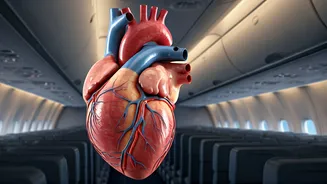Altitude's Effects Explained
At higher altitudes, the reduced oxygen levels put extra strain on the heart. The air pressure decreases as you ascend, leading to lower oxygen partial
pressure. This causes the heart to work harder to circulate enough oxygenated blood throughout the body. People with existing heart conditions can experience worsened symptoms in these conditions. This is because the heart already struggles to function normally. Furthermore, the air inside the cabin is very dry. This can cause dehydration, which leads to a thicker blood concentration. Blood thickening makes it more difficult for the heart to pump blood effectively, exacerbating potential issues. Changes in cabin pressure also affect the body, making the heart's workload even greater. Those with heart issues should take these factors into consideration when preparing to fly.
Protecting Heart Health
Several preventative measures can be taken to mitigate the risks flying poses to heart health. One essential step is to consult a cardiologist before travel, particularly if you have a history of heart problems. Your doctor can assess your condition and provide personalized advice. Proper hydration is critical before, during, and after a flight, which thins the blood and reduces the strain on your heart. Avoid excessive alcohol and caffeine intake, as they can lead to dehydration and increase heart rate. Taking short walks within the cabin, or frequently getting up to move around, helps improve circulation. Compression stockings can also promote blood flow. Be prepared for potential stress by planning ahead. Minimize anxiety and use relaxation techniques, which can also help keep your heart healthy during a flight.
Recognizing Potential Problems
Awareness of the symptoms of heart-related issues is very important during air travel. Chest pain, shortness of breath, and irregular heartbeats are crucial warning signs to watch out for. Other indicators might include excessive fatigue, dizziness, or lightheadedness. It is important to remember that these symptoms are not unique to heart problems, but they always require evaluation. If you experience any of these symptoms while flying, it is imperative to notify the cabin crew immediately. They are trained to handle medical emergencies and can provide necessary assistance. Do not hesitate to seek medical help if you feel unwell; the safety of your heart is the top priority. Quick action can lead to better outcomes and a smoother journey.














